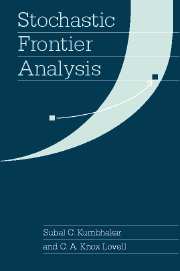Book contents
- Frontmatter
- Contents
- Preface
- 1 Introduction
- 2 Analytical Foundations
- 3 The Estimation of Technical Efficiency
- 4 The Estimation and Decomposition of Cost Efficiency
- 5 The Estimation and Decomposition of Profit Efficiency
- 6 The Shadow Price Approach to the Estimation and Decomposition of Economic Efficiency
- 7 Incorporating Exogenous Influences on Efficiency
- 8 The Estimation of Efficiency Change and Productivity Change
- References
- Author Index
- Subject Index
2 - Analytical Foundations
Published online by Cambridge University Press: 05 June 2012
- Frontmatter
- Contents
- Preface
- 1 Introduction
- 2 Analytical Foundations
- 3 The Estimation of Technical Efficiency
- 4 The Estimation and Decomposition of Cost Efficiency
- 5 The Estimation and Decomposition of Profit Efficiency
- 6 The Shadow Price Approach to the Estimation and Decomposition of Economic Efficiency
- 7 Incorporating Exogenous Influences on Efficiency
- 8 The Estimation of Efficiency Change and Productivity Change
- References
- Author Index
- Subject Index
Summary
INTRODUCTION
The objective of this chapter is to provide an introduction to the analytical foundations of production economics. Our goal is not to provide a detailed exposition of the foundations; this is available in the references provided at the end of the book. Rather, our objective is to provide an analytical foundation that is sufficient to enable the reader to conduct econometric analyses of various types of productive efficiency, which is the ultimate objective of the book. By productive efficiency we mean the degree of success producers achieve in allocating the inputs at their disposal and the outputs they produce, in an effort to meet some objective. Thus in order to measure productive efficiency it is first necessary to specify producers' objectives and then to quantify their degrees of success. This book is primarily concerned with the development of econometric techniques for estimating their degrees of success.
At an elementary level, the objective of producers can be as simple as seeking to avoid waste, by obtaining maximum outputs from given inputs or by minimizing input use in the production of given outputs. In this case the notion of productive efficiency corresponds to what we call technical efficiency, and the waste avoidance objective of producers becomes one of attaining a high degree of technical efficiency. Chapter 3 is concerned with the development of econometric techniques for the estimation of technical efficiency.
- Type
- Chapter
- Information
- Stochastic Frontier Analysis , pp. 15 - 62Publisher: Cambridge University PressPrint publication year: 2000
- 4
- Cited by



